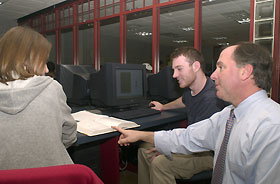|
This is an archived article.
For the latest news, go to the
Advance Homepage
For more archives, go to the Advance Archive/Search Page. | ||
|
Cooper Readies Engineers Professor Doug Cooper, honored earlier this year as a University Teaching Fellow, works hard every day to prepare chemical engineering students to thrive in private industry, even though he once found that same world stifling.
Cooper, who joined the UConn faculty from Chevron18 years ago, teaches specialty courses in process control and numerical methods, using software he invented. But his most offbeat class is Engineering Entrepreneurship. It's a mix of engineering, communications, business, and corporate politics. "Early in the course I tell students to think of themselves as new employees of a company and imagine that I'm their supervisor, not their teacher," Cooper says. "I ask them why the company hired them. The answer is, 'to make money'." Blunt talk like that may shatter the idealism of students who believe their own innate brilliance is reason enough for a paycheck, but Cooper knows from personal experience that success in the corporate industrial world is based on contributions to the bottom line. He loved the pure petrochemical engineering work at Chevron, but detested the endless meetings that often seemed like something out of a Dilbert comic strip. Cooper's designation as a Teaching Fellow means he's particularly effective at what he does. A sampling of anonymous written comments from students at the end of his courses underscores the point: "Effective teaching style;" "made us laugh;" "outstanding demonstrations;" "easy to understand, fair exams" and "Cooper's an awesome teacher." The atmosphere of a Cooper class varies according to his mood, the students' responsiveness, and the subject matter. But one aspect is constant: he strives to engage the students and draw them out. Sometimes he resorts to gimmicks, such as the time he posed a question and not a single hand went up. He announced that he was going to put the question in the form of a written pop quiz and that every student who answered it incorrectly would fail. Those who answered correctly, he says, would fail even more disgracefully, since they hadn't raised their hands. "Some classes I'm hard on them. I'm stern; I'm tough. It's good cop, bad cop," Cooper says. "Other times, I'm engaging and understandin g. I want them to give as much as possible and I'll do the same." Kristin Gardiner, who spent two semesters in his classes as a senior and is now a chemical engineer at a pharmaceutical company in New York, says Cooper was one of the best professors she had at UConn. "He has good teaching skills, well-organized presentations, and makes even dense material interesting," she says. One technique Cooper uses to do this, Gardiner recalls, is his proprietary Control Station software, which students use to see how theory translates into real life in an industrial setting. The software is used in 150 schools and dozens of manufacturin g sites around the world to train engineers and monitor processes that typically involve the flow of a chemical, drug, or material, such as melted plastic. The software contains simulations that allow users to analyze and understand variables that determine how to operate processes in a safe, efficient, and ultimately profitable manner. Flow rates, densities, temperatures, and other elements of a process can be manipulated by the students, allowing them to see how changing one variable affects others. "The software was easy to pick up and very user-friendly," says Geoffrey Shannon, a 2002 UConn graduate who is now a scientist with a drug company in New Jersey. "Professor Cooper would take us through it step-by-step each week, project it on the big screen, and then we'd head to the lab to work with it hands-on." Students like Shannon are required to take the Process Control course, but based on Cooper's teaching style, many also opt to take Engineering Entrepreneurship. There, they learn how to thrive in a corporate environment. Cooper touches on everything from offering firm handshakes and eye contact, to resume- and letter-writing skills. He encourages his students to be able to explain succinctly what they're working on, at a moment's notice. "You never know when a project you're working on suddenly becomes highly visible," Cooper says. "A vice president walks in and wants to know where it stands. You have to be ready. You only get a couple of opportunities to leap forward." |

